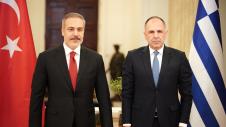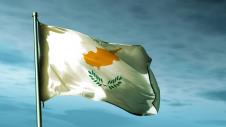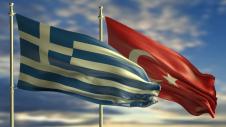Greece will never consent to the raising of sovereignty issues, either in the dialogue with Turkiye or in international jurisdiction, Foreign Minister George Gerapetritis stated on Friday in an interview with SKAI radio. Gerapetritis also clarified that these issues are not included in the discussion and pointed out that such an issue would be a reason to stop further discussion.
The foreign minister made it clear that there has been and will be no retreat with Turkiye. He estimated that if the dispute regarding the demarcation of the continental shelf and the EEZ with Turkey is not resolved there will be no long-term peace in the region. Regarding the talks with the neighbouring country, he said that 15 months after the start of the dialogue in Vilnius, when you talk you always have something to gain. There can be no solution without discussions, he said, adding that during these 15 months, communication channels were established. He emphasised that there are always tensions, but the two governments are working so that tensions do not turn into crises, something that he said has been avoided in the last 15 months. Gerapetritis noted, however, that there are no airspace violations, which is vital for Greece because it establishes its position that the past violations were unjustified.
He pointed out that there were hundreds of violations a day, creating the risk of an accident and that the Armed Forces constantly "had their finger on the trigger". He added that there was excellent coordination between the two countries as regards migration and dealing with trafficking rings in Turkije, noting that there were now fewer flows compared to 2019, while admitted that there are still things that can be done.
"There is not going to be any retreat, nor has there been," Gerapetritis said. He stressed that Greece's rights arise from international law, adding that the EEZ has been demarcated with Egypt and the demarcation with other neighbouring countries remains to be completed. Demarcation is necessary, said Gerapetritis and emphasised that the calm that exists in the Aegean is based on the possibility of dialogue with Turkiye. He said that Greece did not expect Turkiye to back down overnight, but added that when the two countries sit down to discuss, things change.
Referring to the talks with his Turkish counterpart Hakan Fidan, initially - as he said - things will be set at a technical level, and then depending on the progress of the discussion, the next actions will be taken. Since 2002 there have been 64 rounds of exploratory contacts on the subject of demarcation, he added, and the question arises whether Greece won something or whether the two sides came close to demarcation. "The answer is no," he said and noted that the situation remained stagnant and Turkish claims have grown and pressures have intensified. Today, he underlined, the answer is that we want to pick up the thread with a different approach that will be based on mutual understanding and a common will, but also on international law.
The mandate we received from the two leaders - said Gerapetritis - is to investigate whether it is possible to establish a common framework, on which to base the discussion on the demarcation of the EEZ and the continental shelf, which will be based on international law. If there is an agreement on these "then and only then will we go to the leaders to receive an order to proceed on the maps as well. If we don't have a common understanding, we can't move forward", clarified Gerapetritis.
He added that the conditions are right today because Greece has an international capital that is stronger than ever and when you are strong diplomatically, then it is time to talk about the difficult things, and the government has the will to go through the difficult things. As he said, he feels a debt to future generations, and that everyone needs to understand how important it is to minimise risks.
Referring to developments in the Middle East, he said that Greece's relationship with the Arab world at the moment is better than ever and that Greece's attitude is appreciated by the Arabs.
"We support international law," he stressed, "and our national interest is to be able to invoke international law at any time." He called it a "principle error" to try to maintain balance, adding that Greece is currently at the best point it has ever been in terms of its diplomatic strength. He added that there is no possibility of finding a diplomatic solution in the Middle East, without the establishment of a Palestinian state that will be a pillar of stability, combined with the security of Israel, and pointed out that Greece took the most initiatives in the EU for the de-escalation of the crisis.








